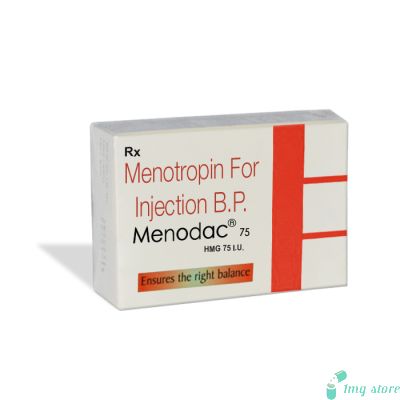Clofert Max Tablet (Clomiphene)
Clomiphene Tablet, known by its brand names Clofert Max and Clomid, is a pivotal medication in women's care and men's health.
Clomiphene Tablet: Unlocking the Power of Fertility and Ovulation:
In the realm of women's health and men's health, the quest for achieving successful pregnancies and overcoming fertility challenges is an ongoing journey. One pivotal tool in this journey is the Clomiphene Tablet, a medication renowned for its role in fertility treatment. This comprehensive guide explores Clomiphene Tablet, including its uses, dosage information, precautions, drug interactions, and potential side effects. Within the landscape of fertility treatments, Clomiphene Tablet stands as a beacon of hope, offering affordable ovulation induction and clinically proven fertility support. Also known by its brand names such as Clofert Max and Clomid, this medication has become a cornerstone of women's care and men's health.
Dosage Information:
Proper Dosage Administration: The recommended dosage of Clomiphene Tablet varies depending on the individual's specific needs and the prescribing physician's guidance. Typically, the starting dose for most patients is 50 milligrams (mg) per day for a span of five days, often beginning on the fifth day of the menstrual cycle.
Missed Dose: If a dose is missed, it's essential to follow the advice of your healthcare provider. In general, taking the missed dose as soon as you remember is advised, unless it's close to the time for the next scheduled dose. In such cases, it's recommended to skip the missed dose and continue with the regular dosing schedule.
Overdose Concerns: Overdosing on Clomiphene Tablet can have serious consequences and should be avoided at all costs. If an overdose is suspected, it is imperative to seek immediate medical attention. Symptoms of an overdose may include nausea, vomiting, hot flashes, visual disturbances, and abdominal pain.
Dosing Adjustments: In some cases, a healthcare provider may need to adjust the dosage based on the patient's response. It is crucial to maintain close communication with your healthcare team throughout the treatment process.
Monitoring and Follow-Up: Regular monitoring and follow-up appointments with your healthcare provider are crucial to assess the medication's effectiveness and make any necessary dosage adjustments.
Clomiphene Tablet, known by its brand names Clofert Max and Clomid, is a pivotal medication in women's care and men's health. Its versatile applications in fertility treatment, affordable ovulation induction, and clinically proven fertility support make it a valuable tool in addressing infertility challenges. However, it is essential to adhere to prescribed dosages, exercise precautions, monitor for potential side effects, and be aware of drug interactions to ensure a safe and effective journey towards achieving one's fertility goals. As the quest for successful pregnancies and improved fertility continues, Clomiphene citrate stands as a beacon of hope, promising a brighter future for individuals and couples seeking to expand their families.
Several alternatives to Clomiphene Tablet are available for individuals facing fertility challenges. One such option is Letrozole, a medication that works in a similar manner to stimulate ovulation. Gonadotropins, like human chorionic gonadotropin (hCG), can also be employed for ovulation induction. In some cases, assisted reproductive technologies such as in vitro fertilization (IVF) and intrauterine insemination (IUI) may offer alternative pathways to achieving pregnancy. These options should be discussed with a healthcare provider to determine the most suitable approach based on individual circumstances. For those interested in acquiring these fertility medications, they can be found through trusted sources such as 1mgstore.com, which provides a range of pharmaceutical options to meet diverse healthcare needs.
Pregnancy and Breastfeeding: Clomiphene Tablet should not be used during pregnancy. If you become pregnant while using this medication, you should immediately inform your healthcare provider. It is also advisable to discontinue breastfeeding while undergoing treatment with Clomiphene Tablet.
Ovarian Hyperstimulation Syndrome (OHSS): Women undergoing treatment with Clomiphene Tablet should be monitored for the development of OHSS, a rare but potentially serious condition characterized by abdominal pain, swelling, nausea, and vomiting.
Ovarian Tumors: The use of Clomiphene Tablet has been associated with a slightly increased risk of developing ovarian tumors. Women with a history of ovarian cysts or related conditions should discuss their medical history with their healthcare provider before beginning treatment.
Vision Changes: Some individuals may experience visual disturbances while taking Clomiphene Tablet. If you notice any changes in your vision, it is important to report them to your healthcare provider.
Multiple Pregnancies: Clomiphene Tablet can increase the likelihood of multiple pregnancies, such as twins or triplets. Patients should be aware of this potential outcome and discuss the associated risks with their healthcare provider.
Best uses
Ovulation Induction: Clomiphene Tablet is primarily used to induce ovulation in women who have ovulatory disorders, a common cause of female infertility. It is a cornerstone of fertility treatments.
Polycystic Ovary Syndrome (PCOS): Women with PCOS, a condition characterized by irregular ovulation and hormonal imbalances, may benefit from Clomiphene Tablet to regulate their menstrual cycles and increase the chances of conception.
Unexplained Infertility: In cases where the cause of infertility is not clearly defined, Clomiphene Tablet is often employed as a first-line treatment to stimulate ovulation.
Male Infertility: Clomiphene Tablet is occasionally prescribed in men to address certain fertility issues, such as low sperm count and testosterone imbalances.
Research and Clinical Trials: Clomiphene Tablet continues to be a subject of research in the field of assisted reproductive technologies, and ongoing clinical trials aim to further explore its potential applications and benefits in the realm of fertility treatments.
Hot Flashes: One of the most common side effects of Clomiphene Tablet is the occurrence of hot flashes, similar to those experienced during menopause.
Abdominal Discomfort: Some individuals may experience abdominal discomfort or bloating while taking this medication.
Mood Swings: Mood swings, emotional sensitivity, and irritability have been reported as potential side effects.
Breast Tenderness: Clomiphene Tablet can lead to breast tenderness, which may cause discomfort.
Visual Disturbances: Some patients may experience visual disturbances, such as blurred vision or increased light sensitivity.
Q: Can Clomiphene Tablet treat male infertility?
A: Yes, in some cases, Clomiphene Tablet is prescribed to address specific male fertility issues, such as low sperm count and testosterone imbalances.
Q: Is it safe to use Clomiphene Tablet without medical supervision?
A: No, it's crucial to use this medication under the guidance of a healthcare provider to ensure proper dosage and monitor for potential side effects.
Q: How long does it typically take to see results with Clomiphene Tablet?
A: Patients often notice changes in their menstrual cycles within one to three months, but conception may take longer and varies among individuals.
Q: Does Clomiphene Tablet guarantee a successful pregnancy?
A: While it enhances the chances of pregnancy, success ultimately depends on various factors, including individual health and fertility issues.
Q: Are there any dietary restrictions while using Clomiphene Tablet?
A: No specific dietary restrictions are associated with this medication, but maintaining a balanced diet is generally advised for overall health.
Q: What are the alternatives to Clomiphene Tablet for infertility treatment?
A: Other alternatives include in vitro fertilization (IVF), intrauterine insemination (IUI), and lifestyle changes for improved fertility.
Q: Can Clomiphene Tablet be used for menopausal symptoms?
A: Clomiphene Tablet is not intended to treat menopausal symptoms. It is primarily used for fertility-related issues in women of reproductive age.
Gonadotropins: Combining Clomiphene Tablet with gonadotropin medications, such as human chorionic gonadotropin (hCG), can enhance its efficacy in stimulating ovulation. However, this combination should only be undertaken under the guidance of a qualified healthcare provider.
Anti-Estrogen Medications: The use of anti-estrogen medications may counteract the effects of Clomiphene Tablet and should be avoided during treatment.
Thyroid Medications: Thyroid medications may interact with Clomiphene Tablet, necessitating careful monitoring and potential dosage adjustments.
Corticosteroids: The use of corticosteroids in conjunction with Clomiphene Tablet may impact its effectiveness, and adjustments to the treatment plan may be required.
Herbal Supplements and Over-the-Counter Drugs: Patients should inform their healthcare providers of any herbal supplements or over-the-counter medications they are taking, as these can also potentially interact with Clomiphene Tablet.
| Manufacturer | : | Maneesh Pharmaceuticals Ltd |
| Equivalent Brand | : | Clomid |
| Generic Search | : | Clomiphene Citrate |


















